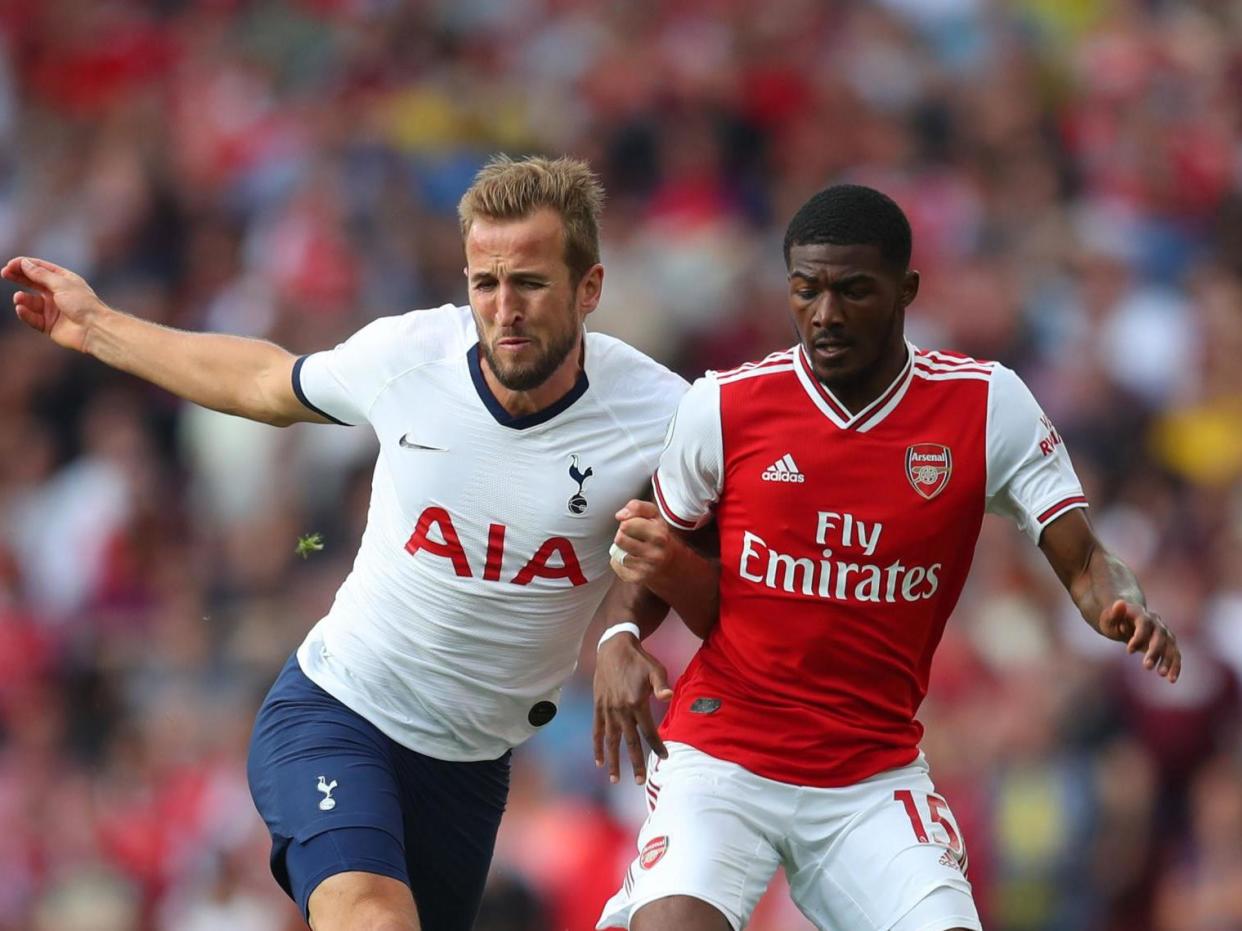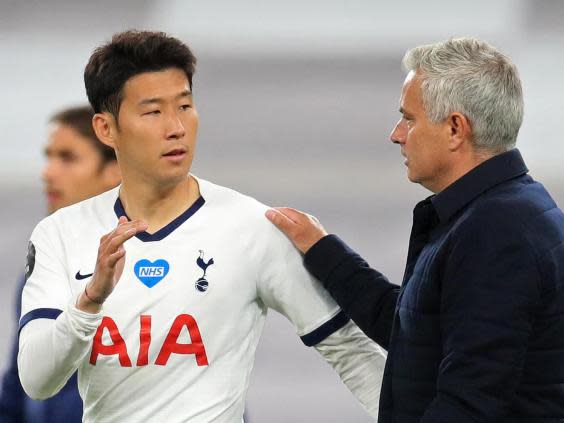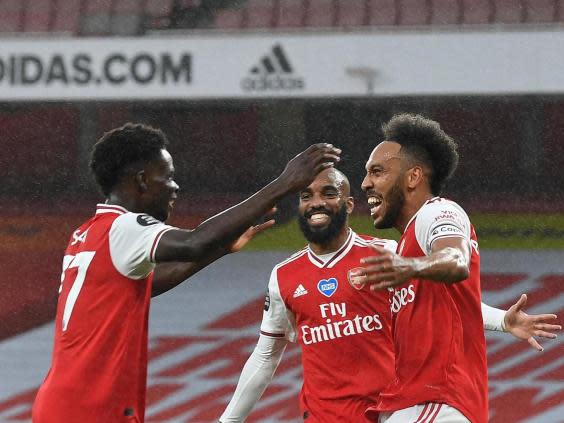Uncertainty clouds Tottenham and Arsenal’s futures ahead of strange north London derby

Sunday sees the first ever north London derby at the new Tottenham Hotspur Stadium and it will be played in front of… no one. It sums up the empty first year of a move that the club staked everything on.
A great fixture will instead just be a subdued occasion. And that’s before Jose Mourinho’s side start playing.
The unfortunate reality is that this stadium hasn’t yet had a special night to create its own legacy. Its only great game was really last season’s first-leg Champions League win over Manchester City, but even that was overtaken by what followed, and all of the special European occasions took place elsewhere. Worse, they ended up as mere last hurrahs of the Mauricio Pochettino era, the uplifting regime this stadium was built on. We’ve only really seen turgid football since.
But this goes way beyond legacy, and may represent one of a few big reasons why both Tottenham Hotspur and Arsenal could struggle to make it beyond fifth place any time soon. There is a big danger of the “big six” becoming the big four plus two.
Some of it is mere timing, but a lot of it is questionable decisions and squandered opportunities.

Sunday’s empty seats will be a reminder of the very real and high cost of this situation.
While these games can at least be played, many other events have been cancelled.
The Spurs stadium was meant to host two NFL games, a Premiership rugby match, a series of concerts, and an Anthony Joshua world heavyweight title.
That is an awful lot of money lost, to go with the corporate income from some huge Premier League games – not least this one. It was money that Spurs really needed even before this pandemic hit. Out of the big six, the situation has hit them especially hard.
Arsenal might be able to empathise, if they weren’t such rivals in such direct competition.
Their own stadium proved unfortunate timing in a different way, as Arsenal fell badly behind the petrodollar clubs.
The club are arguably still paying the price, and trying to catch up. Arsenal themselves certainly could have done with the money from their remaining home games. Out of Europe’s 20 wealthiest clubs, they are the most reliant on match-day income, with that stream representing 25 per cent of their overall revenue. The next closest is Real Madrid, on 19 per cent. Chelsea’s is 15 per cent. Spurs’ is 18 per cent.
The financial issues at both clubs have been well documented. They just aren’t generating the revenue of major rivals, and have fallen behind Liverpool, to fall behind the rest of the big six overall. Those issues have fed into other areas, and made existing problems more pressing. Both, in short, have less room for error – in either managerial appointments or recruitment. They can’t carry failures to the same degree.

The recruitment issues at Arsenal have been similarly well documented. It has left Arteta with a huge job.
The pandemic may have a particularly pronounced effect on them in that area, too. They may not have a market for highly-paid players they need to move on to replenish.
It is why, even though their league positions mean this is the north London derby with the least direct consequences in years, there is so much swirling around it for the long-term.
As important as anything is the impact of the managers. They are of completely different profiles and football philosophies, but have been appointed for the same reason: a response to the specific challenges the club faced.
There is an argument they may not have got it at any other time.
Arsenal strongly considered Arteta when Wenger departed in 2018, but decided against him as they felt they needed more heft and stability. A “proven” name in Unai Emery was selected. After that, and with the club facing all manner of restrictions, they realised they needed someone with the drive and vision for a restart. Picking Arteta was undeniably a brave decision, but they were someway funnelled towards it.
Spurs meanwhile wanted to maintain the club’s elevated profile after the Champions League final, and who has a greater media profile than Mourinho? Many sources say this greatly influenced the decision. The other side of it is that Mourinho would never have previously considered Spurs as a realistic option. He’s always had better offers.
This offer was hugely persuasive even allowing for his own decline. Mourinho is being paid £15m a year, and at the time of his appointment told Levy – and the players – that this is a squad with enough about it to win the league.
That makes it all the more conspicuous that he has recently attempted the old routine of questioning their mentality.

Those questions betray a lack of confidence, that tends to be reflected in safety-first approaches. Mourinho’s primary instinct still feels geared towards preventing defeat rather than proactively claiming victory.
The contrast with the football Arsenal played against Leicester City on Tuesday was striking. It isn’t an exaggeration to say they put out at least 40 minutes that represented some of the best attacking play this season – and that just weeks after this group seemed unmanageable. It was a rare source of real optimism for the club in these times.
Mourinho hasn’t really offered anything close, or close to Pochettino’s best days.
Spurs used to be spoken of in these ways, when the fire of their 2016-18 football just felt so energising.
From a wider perspective, it increasingly feels like the appointment of Pochettino was an aberration in a long line of managerial failures at White Hart Lane. It was a rare one they got absolutely right. The Argentine transformed the club. He played a huge part in the building of this stadium
He deserved to be backed, and allowed a Ferguson-style rebuild when it inevitably started to go stale. Spurs essentially bottled that decision.
Rather than the rebuild that would have taken a longer time and more money, they went for the cheaper, short-term fix – even if that was in the guise of one highly-paid managerial contract.
It may prove much more costly in the long term. Mourinho has already illustrated he isn’t all that enamoured with Spurs’ younger recent signings, some of whom he’s willing to discard. It similarly looks like he’s going to require the rebuild Pochettino would have required anyway, at a time when there are fair questions over whether Mourinho needs to rebuild his outlook on the game, and they look to be falling further away from the Champions League.
Arsenal meanwhile should have appointed Arteta in 2018. They evidently lost time there, and a sense of direction. It feels like he’s going to be fighting the tide for some time.
They could still lose this game.
For all the fair debate about the modern Mourinho, matches like this best suit him, especially when it’s against a relative novice. Arsenal’s approach should mean he is free to sit deep and merely try and counter.
It still worked against Manchester City. It almost worked against Liverpool.
It may well work against Arsenal, on the day. But that’s kind of the point. It’s one for the day. It’s short-term.
It is one of a few issues that raise questions about these clubs in the medium term.
Read more
Lo Celso brings perfect balance of light and dark to Mourinho’s Spurs


